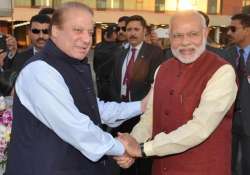‘PM Modi looking forward to visit Pakistan for SAARC Summit’
Dubbing Kashmir as an internal matter of India, the Indian envoy in Pakistan has said that people who live in houses made of glass should refrain from throwing stones at others. This remark by the

Indian High Commissioner in Pakistan Gautam Bambawale has said that Prime Minister Narendra Modi is looking forward to visit Islamabad for the annual SAARC Summit later this year.
“Prime Minister Modi is looking forward to visit Islamabad for the SAARC Summit,” Bambawale replied when asked whether Modi will visit Pakistan to attend the SAARC Summit.
After Bambawale’s remarks were reported by the Indian media, Ministry of External Affairs spokesperson Vikas Swarup clarified that the ‘decisions and announcements of such nature are not made so far in advance’.
“As I stated in my weekly briefing, decisions and announcements of such nature are not made so far in advance,” he tweeted.
Other officials said a final decision is yet to be made and it would be announced at the right time.
“We will only announce dates for any visit of the prime minister just before the visit,” a top government official told reporters on terms of anonymity.
The 19th SAARC Summit will be held in Islamabad on November 9 and 10 later this year, Pakistan’s Foreign Office had announced last month.
In a statement, the Foreign Office said that Premier Nawaz Sharif has invited the leaders of SAARC Member States to grace the Summit with their presence and is looking forward to welcoming them in Islamabad.
The High Commissioner’s remark holds significance as it remained unclear whether Modi will travel to Pakistan for the summit given the strain in bilateral ties over the issue of cross border terrorism.
Speaking at an interactive session organised by the Karachi Council on Foreign Relations on Monday, he once again again described Kashmir as an internal matter of India and asked Islamabad to focus on resolving its ‘own problems before looking into the problems of other countries’.
“There are problems in both India and Pakistan and you [Pakistan] should focus on resolving your problems before looking into the problems of other countries,” he said.
“People living in glass houses should not be throwing stones at others,” he answered to a question on the Kashmir issue and the recent statement by Prime Minister Narendra Modi on Balochistan.
About the statement made by Modi, the envoy said, "The Prime Minister, in his August 15 independence day speech, only referred to the letters he had received."
He said that the Indian government had been saying, "Let's work together to get to the bottom of terrorism which is a headache not only for Pakistan, but for India and the world."
Bombawale said the two countries should not be talking on just one issue, but on all issues.
He said that even while tensions were high between the two nations, there had been contacts at the operational level, The Dawn reported.
Over the past one-and-a-half month, there had been "cordial" interactions between Pakistani and Indian border forces. Several meetings of the South Asian Association for Regional Cooperation (SAARC) had also been held.
Bambawale also called for greater trade ties between Pakistan and India and said political issues will take time to resolve.
He said that Pakistan should also grant India the Most-Favoured Nation status.
"There should be more participation in trade fairs and more Pakistani trade delegations should visit India," he added.
"There is no option but to do it step by step," he said.
The Indian envoy said the road to normalisation of ties between the two countries lies through greater trade and business.
The roadmap in this regard was prepared by the two governments in 2012 could be unveiled soon. The total trade between the two countries was worth just USD 2.5 billion (Rs 16k crore approx) a year, whereas its potential was of USD 20 billion (Rs 1.3 lakh crore approx), he said.
"There is a great potential that needs to be tapped," he said.
According to reports in the leading Pakistani newspapers, he said that political issues take time to resolve but the two countries can take up smaller matters and move forward.
With PTI Inputs